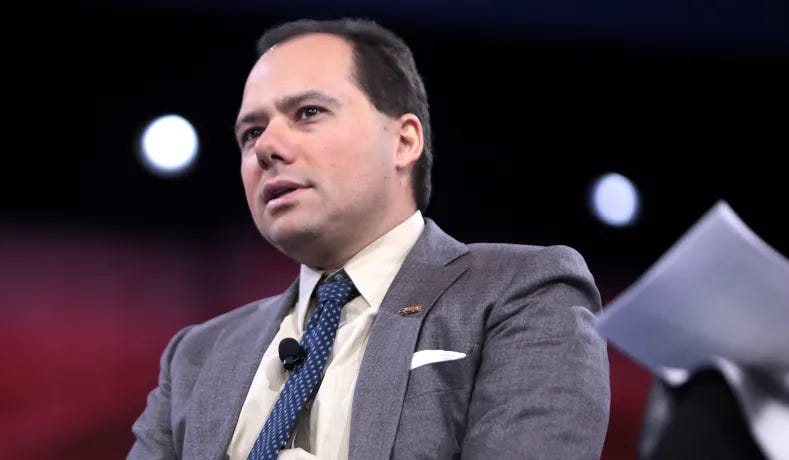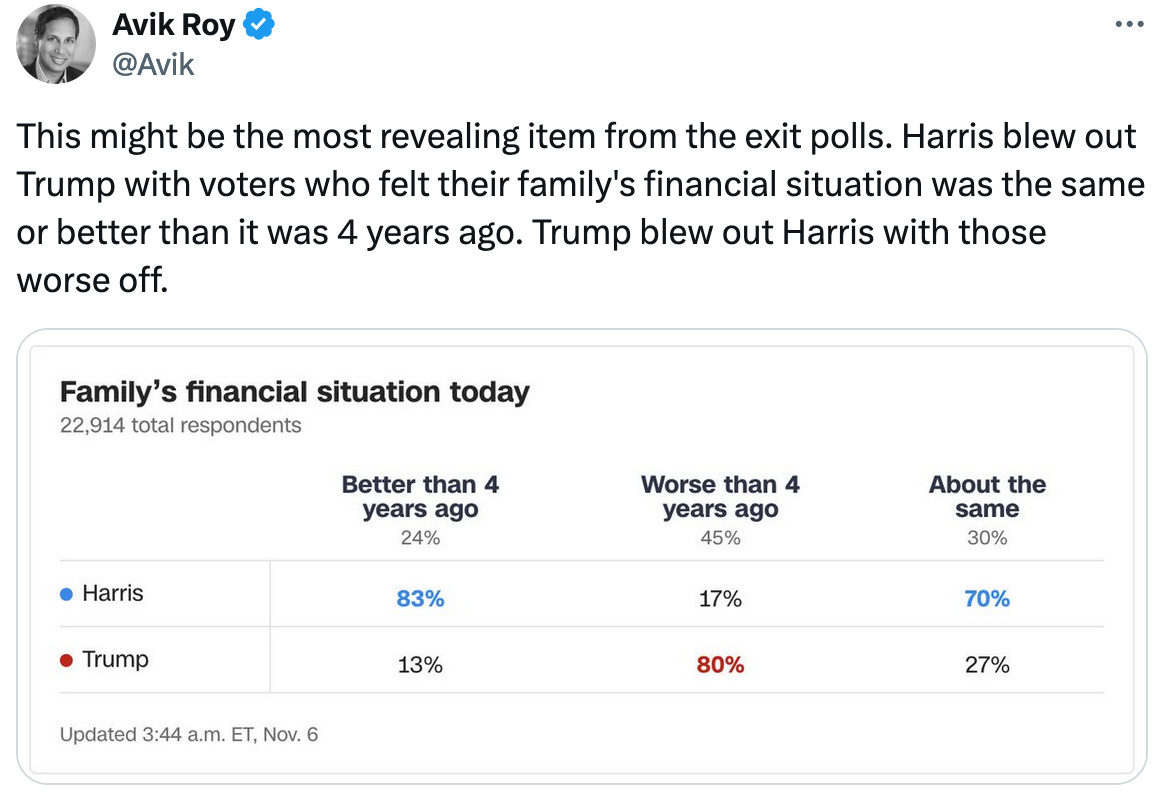Trump up
FreeCons discuss 2024 election results and the future of the Right
Staging one of the most astounding reversals of political fortune in history, Donald Trump won a decisive victory for president even as Republicans regained a solid majority in the United States Senate and won key congressional, state, and local offices across the country.
For more than a year, Freedom Conservatives have been preparing for this scenario. We’ve been recruiting signatories and allies, crafting messages, and planning a series of public forums to help shape the conversation about policy priorities and the future of the American Right.
The election results present conservatives with many opportunities. FreeCons will do our part to help policymakers capitalize on them.
But there will also be challenges. While most right-of-center candidates who emerged victorious Tuesday night share our priorities — among them tax relief, regulatory reform, public order, educational freedom, and equality before the law — others embraced corporate welfare, protectionist tariffs, and other causes that FreeCons oppose.
Today, we spotlight several signatories who’ve already weighed in on the 2024 elections and their political and policy implications.
Change election
John Hood, president of the John William Pope Foundation and one of the leaders of the FreeCon project, wrote at National Review Online that Kamala Harris and her party deserved to lose the 2024 elections.
“Harris was inescapably tethered to a deeply unpopular administration during a change election,” he pointed out. “When asked to specify how her presidency would substantially differ from Joe Biden’s, she had no intelligible answer. Americans are clearly unnerved by international conflicts, worried about illegal immigration, and outraged by inflation. Progressivism is waning, not waxing. On nearly every highly ranked voting issue, polls find Republicans more trusted than Democrats.”
While the election answered some key questions, Hood wrote, the shape and priorities of American conservatism remain disputed ground.
“Despite its best efforts, the nationalist-populist Right hasn’t persuaded voters to abandon their traditional views, as both pre-election and exit polls confirm. More than 80 percent of Trump supporters prefer a smaller government providing fewer services to a larger one providing more. Only 22 percent of Harris supporters feel the same.
“Republican voters overwhelmingly disapprove of labor unions and think their decline has been good for working people and the country as a whole. Most Republicans, including those who self-identify as MAGA, see both Russia and China as America’s enemies, are rooting for Israel to win and Vladimir Putin to lose, and want the U.S. to remain the most potent military power in the world.
“Few agree, or will ever agree, with fringy causes like integrating church and state or repudiating the classical-liberal legacy of the American Revolution.”
War machine
Ilya Shapiro is a senior fellow and director of constitutional studies at the Manhattan Institute and a FreeCon signatory.
“Beyond creating or ignoring overlapping crises on the border, inflation, and crime, and pursuing a feckless foreign policy that endangers America and emboldens its enemies, Biden and Harris misread their modest “return to normalcy” mandate to enflame Culture War 3.0,” he wrote on X.
“People simply don’t want whole-of-government DEI, radical gender ideology, or censorship and gaslighting under the guise of ‘misinformation policing’ or ‘expert policymaking.’ They can also see through calls to blow up norms, rules, and institutions in the name of saving them, whether in the context of court-packing and filibuster ‘reform’ or anything else.
“Donald Trump may be an unlikely vessel to carry hopes for sound governance, but — setting aside his actions after the 2020 election and personal foibles — people generally liked his policies more than what Biden has pursued or Harris promised.”
Other FreeCon takes
• Avik Roy, president of the Foundation for Research on Equal Opportunity and one of the leaders of the FreeCon project, spotlighted a key exit-poll result:
• In an interview with Sinclair Broadcasting, Steve Moore of Unleash Prosperity said voters opted for Trump because they sought “sensible” economic policies to replace those of the Biden administration.
“This was about 'the economy, stupid,' as Bill Clinton used to say. There’s no question Americans were feeling financially stressed out, that the inflation of the last four years has really put Americans under incredible financial strain.”
• In The Washington Post, columnist George Will argued that Democrats had sabotaged their own cause.
For example, Barack and Michelle Obama “descended from Olympus to remind us of the meaning of ‘insufferable.’ And to demonstrate why progressives persuade only themselves. The Obamas scolded approximately half the electorate for disappointing the Obamas, who are weary to the point of irritability by the chore of teaching their deplorable inferiors this: If you will please just vote as we Obamas consider hygienic, you will disguise your moral backwardness that requires us to stoop to instructing you.”
• At National Review Online, editor Ramesh Ponnuru offered another explanation for the Democratic implosion: their surprisingly strong performance in the 2022 midterms.
“Doing much better than expected that year helped persuade Joe Biden to stick around way too long. If he had dropped out a few months later, the Democrats could have held a primary. It would have been a bitter fight, but it would have given the Democrats a chance to nominate someone not so tied to an unpopular administration.”
• Tim Andrews of Americans for Tax Reform contrasted the two presidential campaigns in a post:
• “America remains deeply polarized, and some of Mr. Trump’s proposed policies — such as the expensive sales taxes that his tariff ideas constitute — could prove unpopular,” wrote Karl Rove in The Wall Street Journal. “This could boomerang on him in the 2026 midterms. And second terms are rarely easy.”
In his post-victory remarks, Trump promised to “fight for you, for your family and your future.”
“If the new president focuses his prodigious energies on this, he can achieve good things in the next two years,” Rove concluded. “But if he makes a priority of settling scores with opponents — which he promised to do during the campaign — he’ll waste his limited time and precious political capital.”




